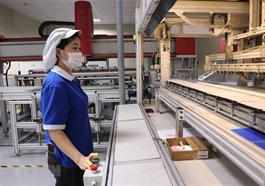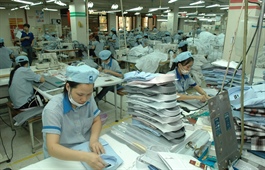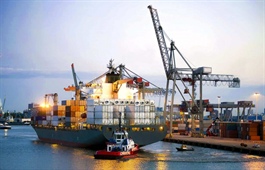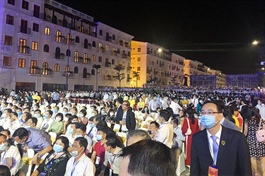CPI faces two development scenarios this year: Expert
CPI faces two development scenarios this year: Expert
An economic expert has forecast two possible scenarios that will affect the consumer price index (CPI) this year. 
In the first scenario, once the COVID-19 pandemic is brought under control, the global economy will gradually recover, with prices set to strongly increase due to the dual impact of economic recovery and the benefits of huge stimulus packages implemented by countries, according to Le Quoc Phuong, former Deputy Director of the Industry and Trade Information Centre under the Ministry of Industry and Trade.
Then, the nation’s price level will be under increasing pressure. In the event that drastic price management measures are not realised, the average CPI could increase by 4 to 4.5 per cent.
In line with the second scenario and the COVID-19 pandemic is not brought under control, difficulties will occur in global economic recovery. As a result, prices will not sharply increase, therefore it will be unlikely for the country’s price level to see a sharp increase, with annual average CPI forecast at roughly 3.8 to 4 per cent, Phuong said.
He said that a number of products will be adjusted throughout 2021 according to the roadmap, with price increases greatly dependent on the socio-economic situation.
This year, it will be vital to take the initiative in implementing the Government’s solutions in line with the actual situation to control the price of commodities, especially essential goods, Phuong said.
"Inflation in 2021 at the beginning of the year is forecast to be low and increase gradually in the following months to the end of the year. It is imperative to keep the CPI steady at a low level. If it is done well, inflation will be kept at just over 3 per cent by the end of this year," Phuong told the Voice of Vietnam (VoV).
According to Nguyen Duc Do, deputy director of the Institute of Economics and Finance, in 2021, when the COVID-19 pandemic is controlled thanks to vaccines, economies at home and abroad will recover and inflation will tend to increase again.
However, the average inflation in 2021 will not be high, especially when the economy is not likely to recover completely this year.
Dr Nguyen Ngoc Tuyen from the Ministry of Finance’s Academy of Finance has forecast that many essential goods will fluctuate in 2021, so the CPI will rise higher than in 2020, but the average inflation for this whole year is just below 4 per cent as the target set by the National Assembly, reports bnews.vn.
In 2021, in order to control inflation according to that target, the Ministry of Finance said that it would closely monitor changes in supply and demand, and prices of essential goods, especially for some with high demand at the end of the year and essential goods for people in regions affected by natural disasters, floods and the pandemic.
It would proactively prepare reserves to meet demand, which often increases at the end of the year, to limit price increases.
At the same time, the ministry would continue to adjust fiscal and monetary policies as well as other macroeconomic policies to control inflation.
Those would contribute to removing difficulties in production and business and the lives of people affected by the COVID-19 pandemic, Tuyen said. Especially, the authorities needed to proactively forecast, calculate and build scenarios to control prices of essential goods according to the roadmap.
Phuong also said that to curb inflation in 2021, the Government should ensure a balance of supply and demand, as well as transparent market information.
Ngo Tri Long, an economic expert, believes that the year ahead will be very difficult to predict. As a result, price management should continue to be carried out in a prudent, flexible, and proactive manner, whilst the fiscal policy should be combined with monetary policy and other macroeconomic policies as a means of keeping inflation in check and in line with set targets.
A boost in commodity prices is anticipated to be very high and erratic due to consumer demand, requiring the Government and relevant ministries to devise specific solutions regarding price management.
Provided that the solutions are properly implemented during the first quarter of the year, it would serve as a premise for the following quarters to meet the target on inflation control as set by the National Assembly, Long said.
Despite suffering a slowdown in production and business activities as a result of the impact caused by the COVID-19 pandemic, the Vietnamese economy enjoyed positive annual growth of 2.91 per cent in 2020, according to the experts.
Macroeconomic stability and inflation being controlled at 3.23 per cent is seen an important premise for the nation as it continues to meet the GDP growth target of approximately 6.5 per cent and control inflation at under 4 per cent as set out by the Government for the year ahead.
Last year saw the Government and Prime Minister Nguyen Xuan Phuc direct ministries, sectors, and localities to remain prudent in their management in order to ensure the harmonisation of common goals, while also ensuring the stability of market price levels, curbing inflation, and removing difficulties faced by firms.
Due to these efforts, the average CPI in 2020 witnessed a surge of 3.23 per cent compared to the average seen in 2019, lower than the target of below 4 per cent set by the National Assembly. Indeed, core inflation in 2020 saw an increase of 2.31 per cent compared to 2019’s figures.
According to Nguyen Anh Tuan, director of the Price Management Department under the Ministry of Finance, there are a number of factors that adversely affect the price situation, with complicated developments occurring in fuel products, coupled with abrupt increases and declines that are difficult to forecast.
In addition, is also challenging to stabilise prices for essential commodities, including pork, in the scenario that disease is uncontrollable. Consequently, insufficient supply will impact the local market.
Tuan said there was the necessity of considering factors relating to natural disasters as a means of taking preventive steps, being more proactive to solve difficulties faced by businesses, boosting production as a means of ensuring continued supply and demand, and controlling inflation. Therefore, ministries and sectors must continue closely following the market price situation to achieve more effective management.




















